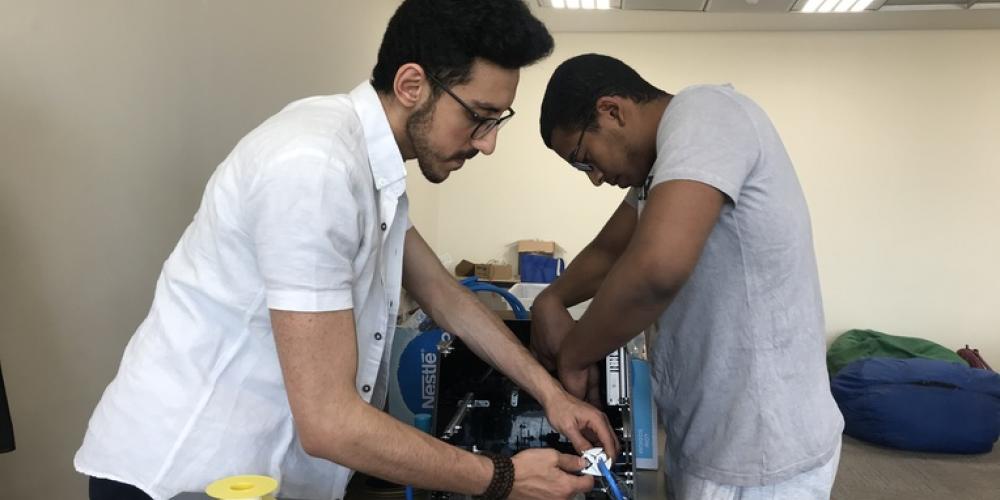
Our students continue to amaze us with their entrepreneurial spirit! Engineering student Ahmed Elborolosy (first year master’s student) had gone home to Egypt when the ‘lockdown’ started in Belgium to be closer to his family. But one week after arriving, he saw an opportunity to help his country and decided to team up with his alma mater Zewail University of Science and Technology to develop a prototype COVID19 ventilator.
Ahmed is in his first year Master of Science in electro-mechanical engineering, doing the aeronautics track at VUB. We chat with Ahmed through the magic of technology.
VUB: “Ahmed, why did you choose to study in Brussels and at VUB in the first place?”
Ahmed: “I wanted to attend a well-ranked university that had a master’s programme in aeronautics, with reasonable fees, in an international city, with an airport that allowed me to get home to Egypt easily, and with not too much time difference. VUB was the only university to hit all marks. And when I came here, it was exactly as I’d hoped it to be."
VUB: “How have you managed your studies and life during the coronavirus pandemic? You are back in Egypt, right?”
Ahmed: “At the beginning I was unsure whether I should stay at VUB in my VUB rooms, or whether I should go back home to be with my family during these tough times. I especially worried about what would happen with my studies if I went back home. But I decided to return to Egypt, otherwise I’d stress and worry about how my family was doing. I was very happy to hear that VUB decided to put the rest of the semester online, and that I can do all my exams online as well. What a relief!”
VUB: “Where did you get the inspiration to team up with your colleagues from your alma mater Zewail University to make a prototype COVID19 ventilator?”
Ahmed: “One week after I arrived back, it was clear there was going to be a high demand for mechanical ventilators in Egypt. The country only has 7,500 ventilators but has a population of more than 100 million. I read up about internal designs, the requirements and how to test for a ventilator and focused my research on the features that were needed specifically for a COVID19-ventilator. I really felt this was possible with the right supervision. I reached out to my former university colleagues at Zewail University to form a team to make a mechanical ventilator using only local materials available in Egypt. Zewail University of Science and Technology gave the team its full support to deliver the prototype as fast as possible. Three weeks later under the supervision of Professor Amr Helmy we presented a fully functional ventilator prototype. Local media came to film our work and that led to us being contacted by the Egyptian Ministries of Health and Industry. They assured us they would provide all that was needed to get the product on the production line after having passed all the tests. That’s where we’re at now."
VUB: “What did the Ministry of Health and the Ministry of Industry say to you when you presented them the prototype?”
Ahmed: “We presented our work to their specialists and they were surprised by the amount of effort and achievement accomplished in such a short time span. They gave some feedback to tweak our design and we discussed the materials and services needed to get it into production as fast as possible. “
VUB: “Have you been in touch with your fellow VUB students and professors throughout this process? Did you tell them about this?”
Ahmed: “Yes indeed. For my studies at VUB I have to submit a big project (5 ETCS) and defend it in front of my supervisors. I’m lucky because my supervisors, Professor Hendrick and Professor Gyselinck, have both agreed to accept this ventilator project as my MA1 project, which is a huge relief and a weight off my shoulders.”
VUB: “How do you feel having accomplished something remarkable as this?”
Ahmed: “I never expected we would be at this point now. I just felt I had a responsibility to do something with the knowledge I have. And when I saw our prototype pass the first verification test, I was just overjoyed and so pleased to be part of this, just thinking of the number of lives we could help save.”
VUB: “What are your plans now? When do you think you’ll be back in Brussels?”
Ahmed: “All the exams are online, so for the current semester there is no need now to go back, but if the airports open again and life goes back to normal, I’ll be back in Brussels to do my industrial internship.”
VUB: “Any tips for other engineering students who like you have gone back home and might want to make ventilators in their home countries too?”
Ahmed: “The basic idea is simple but there are a lot of complications for the implementation of it, but with the right supervision and some financial and technical support in good facilities, you should be able to develop a basic mandatory mode ventilator. To take it a step further and include more modes and safety measures you’ll need commitment and do more and more research, but that’s what we as engineers do all the time anyway.”
You can find out more about the ventilators Ahmed and the team made, including a video, on this link.